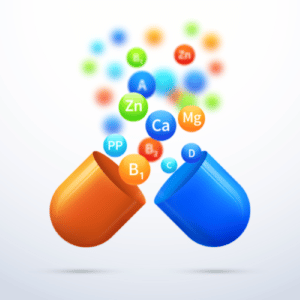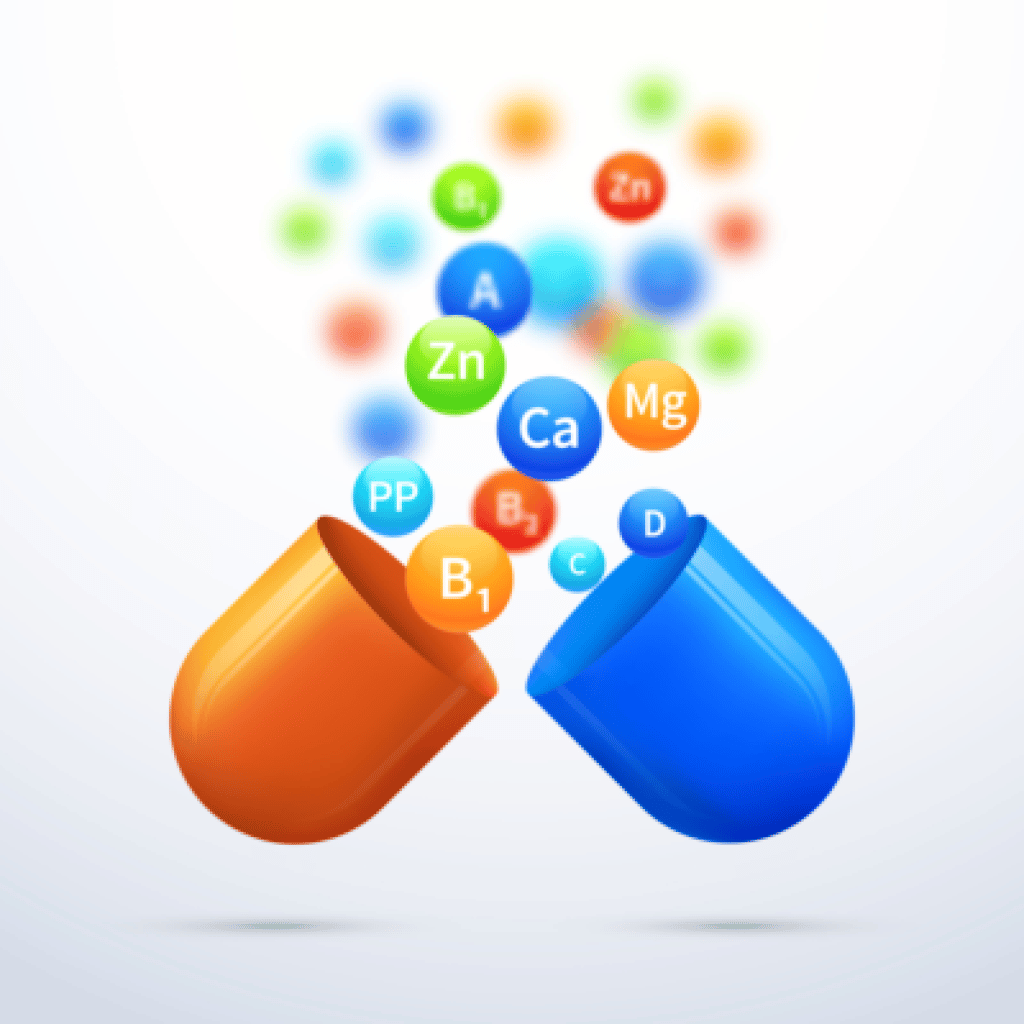
Top 5 Vitamins and Minerals for Your Immune System
The human body requires a wealth of resources for normal healthy functioning, particularly micronutrients that are used to support the immune system – and while all vitamins and minerals have an important role to play, some are more important than others.
1. Vitamin A
Vitamin A, also known as beta carotene, is a fat-soluble vitamin found in carrots, sweet potatoes, spinach, cantaloupe, and egg yolks. A fat-soluble vitamin is one that only dissolves in fat or oil, which is part of the reason why fat-soluble vitamins are stored in adipose fat in the body when not in use.
Why Vitamin A Is Important
While Vitamin A plays a role in vision and tissue growth, it also has an essential role in the immune system. Specifically, Vitamin A regulates the immune system to help fight off infections and is sometimes referred to as the “anti-infection vitamin” because it helps the body fight off viral, bacterial, and parasitic infections.
Recent studies have found that Vitamin A is a key component of having a tolerant immune system, which is the hallmark of good health; because Vitamin A is associated with tissue growth, clinical research has found that Vitamin A is crucial to building immune tolerance within the tissue lining the digestive tract.
2. Vitamin C
Vitamin C (ascorbic acid) is a water-soluble vitamin found in many foods, such as citric juices and fruits, tomatoes, broccoli, and spinach. A water-soluble vitamin is one that does not stay in the body as it is processed through normal waste elimination, mainly through urination. Because water-soluble vitamins are eliminated through digestion, people generally need to consume these vitamins daily.
Why Vitamin C Is Important
Like Vitamin A, Vitamin C is heavily involved in supporting healthy tissue growth and wound healing. Vitamin C is also frequently taken with iron to help absorption. Importantly, Vitamin C is also known to stimulate the production of white blood cells, which are important in the immune system and responsible for fighting off infections. When people are deficient in Vitamin C, they are more likely to have weak immune systems and are more susceptible to disease.
Studies indicate that people require a higher daily intake of Vitamin C compared to other vitamins, almost up to 100 times the standard daily value of other vitamins; in other words, Vitamin C might be the vitamin that needs to be taken in the highest quantity in order to support a healthy immune system. Taking an adequate amount of Vitamin C each day, about 100-200 mg, is associated with the reduction of chronic disease.
3. Vitamin B5
Vitamin B5, also known as pantothenic acid, is a water-soluble food that can be found naturally in foods such as lentils, sunflower seeds, mushrooms, avocados, spinach, and poultry; Vitamin B5 is also sometimes added to enrich food, such as whole grains or milk.
Why Vitamin B5 Is Important
Like other B Vitamins, B5 is involved in the conversion of carbohydrates into glucose, or converting food into fuel. Vitamin B5 plays a role in creating blood cells but is more importantly associated with regulating the immune system, reducing bacterial growth, and improves the circulation of antibodies within the blood.
Antibodies are a vital component of the immune system. In fact, the immune response relies almost entirely on the body’s ability to create antibodies that can fight against foreign cells, particularly viral and bacterial invaders. Antibodies are essentially the immune system’s main defensive mechanism against disease and infection; once your immune system has made antibodies to fight an illness, those antibodies will stay in the body until they are needed again.
4. Vitamin B12
Vitamin B12, or cobalamin, is another water-soluble vitamin that is found naturally in many meat products, including poultry, fish, eggs, and milk; Vitamin B12 is frequently added to processed foods to fortify them, especially in cereals. However, Vitamin B12 is one of the more challenging vitamins to absorb – in fact, many people have difficulty absorbing Vitamin B12 as they age, which can lead to deficiencies that compromise the immune and nervous system, as well as cognitive function.
Why Vitamin B12 Is Important
Vitamin B12 plays an important role in the immunity of body cells, particularly the cells it is heavily involved in creating, which includes blood cells, nerve cells, and the DNA within cells. Research suggests that Vitamin B12 deficiency causes suppression of normal immune responses; in other words, without enough B12 in the body, the immune system is slow to react and less efficient.
Because Vitamin B12 is known for lowering the high levels of homocysteine associated with cardiovascular disease, some studies suggest that taking B12 with other B vitamins may help prevent the progression of heart disease.
5. Zinc
Zinc is a mineral that is naturally found in some foods, such as meat, milk, and whole grains, and it is often added to processed foods for fortification. Zinc is also often the primary ingredient in many cold remedies, such as throat lozenges. However, because the body does not have any natural place for zinc storage, it is often recommended that zinc be taken daily to help regulate cellular metabolism and other aspects of healthy growth and development.
Why Zinc Is Important
Zinc is often called the “gatekeeper of immune function” as it is essential to the function of a healthy immune system. It is a well-known mineral associated with anti-inflammatory and antioxidant properties. Zinc is important for wound healing as well as helping the body fight off infection from bacteria and viruses.
Studies indicate that zinc taken at the onset of a cold or virus will help shorten the length of the infection, which is why it is often present in remedies for viral infections such as the common cold or seasonal flu. Zinc plays a special role in supporting T-cells, which is a special type of red blood cell associated with fighting off foreign pathogens. For this reason, higher quantities of zinc are recommended for aging adults to boost the immune system response.
What Determines Your Nutrient Needs?
Although each of these vitamins and minerals are essential in the support of a healthy immune system, the amount you need for healthy functioning is determined by your nutritional needs. The nutritional needs of all people can differ based on a variety of factors, such as gender, age, genetics, weight, physical activity level, and the nutrients that are able to be absorbed by the body through regular food intake.
In particular, age is one of the most informant factors about the type and amount of nutrients necessary to support healthy infectious & immune health. For example, recall that vitamin B12 becomes more difficult to absorb naturally from food as people age; this is true of other micronutrients, particularly zinc.
What’s the Best Way to Take These Vitamins and Minerals?
Although it is ideal to absorb these vitamins and minerals from food consumption, this is sometimes not possible for people whose genetics determine low absorption rates or those who are not eating high enough quantities of food with the vitamins and minerals present. For that reason, certain dietary supplements are recommended to help support a functioning immune system. The three main methods of taking these supplements consist of:
Specific Supplements
You can buy individual vitamins and minerals to supplement your diet. For example, if you and your physician agree that you have a deficiency of a certain vitamin, you may be put on a regimen to take that vitamin daily with a supplement. Most vitamins and minerals are sold individually at pharmacies, drug stores, and health stores.
Multivitamins
Multivitamins may also be a good way to meet the specific daily requirements of certain vitamins and minerals. Taking a daily vitamin is ideal for those who need to support the intake of multiple vitamins. It’s common for multivitamins to be formulated for specific ages, genders, or health needs.
Immune Support Supplement
People may also consider taking supplements specially formulated for immune support, especially if they are interested in boosting overall immune efficiency and infection prevention. Immune support supplements are similar to multivitamins, however, their ingredients are typically concentrated on vitamins and minerals that are associated with healthy immune function.
One such immune support supplement is Viracell capsules, which are designed to boost the performance and defenses of the immune system. Viracell contains all of the most important vitamins and minerals associated with maintaining immunocompetence, including Vitamins A, C, B5, B12, and the mineral zinc. To increase absorption and further support the immune system, Viracell also contains botanical extracts such as black elderberry and echinacea, both of which have been traditionally associated with effective immune system responses.
How Should You Use Dietary Supplements for Infectious & Immune Health?
Dietary supplements can help make sure you meet the daily requirement of key vitamins and minerals to support a healthy and effective immune system. You should always speak with a physician before taking a dietary supplement. For most dietary supplements, it’s generally recommended to take 1 to 2 capsules, tablets, or chews a day.
Some supplements for immune support suggest taking the supplement more frequently during the onset of illness to provide the immune system with more immediate support. For example, taking a supplement rich in zinc can help boost the immune system response, especially in immunocompromised people such as the elderly or those with weakened immune systems.
Strengthen Your Infectious & Immune Health With Dietary Supplements
When the immune system is weak due to a lack of vitamin and mineral resources, it’s easier to get sick. The best way to protect your health is to fortify your immune system with immunocompetent resources such as Vitamins A, C, B5, B12, and zinc.
If you aren’t sure that you’re absorbing enough of these vitamins and minerals from your food, or you think the factors that determine your dietary needs may require additional support, you might consider using a dietary supplement, such as Viracell. To learn more about how you can strengthen your infectious & immune health, contact Pellecome in Gladstone, NJ, your source for science for better living.


